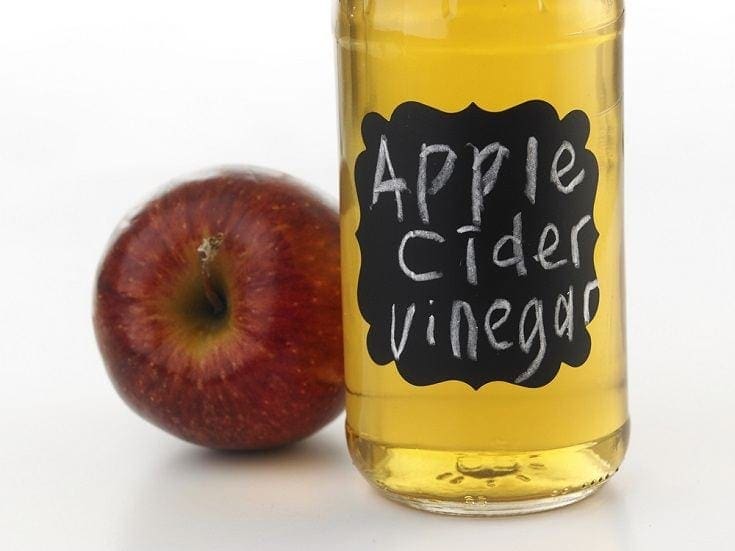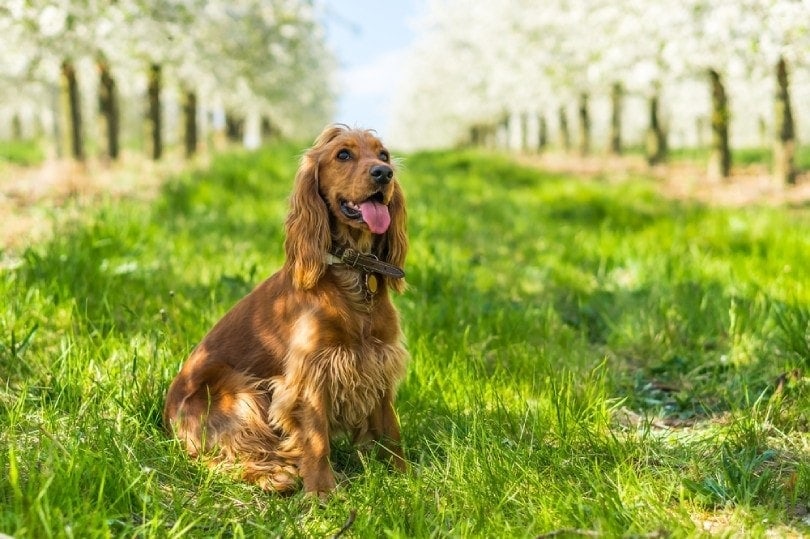Apple cider vinegar is often touted as a new-age miracle cure for a host of health concerns in humans and dogs alike. The claims range from mild to wild, with some people even stating that apple cider vinegar is a cure for cancer! But if you look closely, you’ll see that apple cider vinegar is nearly devoid of nutrients. It’s got potassium, about 11mg per tablespoon, but that’s about it. However, it’s full of antioxidants and even has antibacterial qualities.
So, is apple cider vinegar a miracle cure for a variety of canine ailments or is it just snake oil?
Truthfully, it’s far from a miracle cure. You won’t be curing cancer with apple cider vinegar and it won’t eliminate your dog’s UTI. But that doesn’t mean it’s not helpful in other ways. Let’s take a look at eight ways, backed up by science, that apple cider vinegar can benefit your dog.
The 8 Benefits of Apple Cider Vinegar for Dogs:
1. Keeps Your Dog’s Coat Clean
Apple cider vinegar is known to be a great cleaner. Moreover, it’s completely natural; made from just apples and water. Compared to other dog shampoos that can be laden with chemicals, apple cider vinegar provides a safe and all-natural alternative. Just be careful not to get any of the vinegar in your dog’s nose, mouth, or eyes.
2. Is a Cure for Itchy Skin
Apple cider vinegar is known for having antibacterial, antiseptic, and even anti-fungal properties. This makes it a great way to relieve a dog with itchy skin. Just be sure not to apply the vinegar on any open wounds. If your dog has scratched itself until it’s bleeding, you might need a trip to the vet!
3. Reduces Unpleasant Odors
Known as a great cleaner and disinfectant, apple cider vinegar is often used as a natural alternative to strong chemical cleaners. This is partially because the acid is great at neutralizing strong odors. When your dog is starting to have some unpleasant odors that you need to eradicate, try washing them with a solution of apple cider vinegar. It’s a healthy and natural way to reduce any unpleasant smells attached to your dog.

4. Acts as Insect Repellent
Many people claim that apple cider vinegar is a great treatment for fleas. Well, that’s not quite true. Apple cider vinegar can’t kill fleas; the acid isn’t strong enough to penetrate and kill the eggs or larvae. But fleas and other insects don’t like the vinegar, so they’re more likely to look for an easier target. So, while apple cider vinegar won’t cure a flea infection, it can help to reduce their numbers or prevent fleas from becoming an issue in the first place.
5. Is a Cure for Ear Infections
Because of its antibacterial properties, apple cider vinegar is a good way to fight infections, including ear infections. Many dogs are very susceptible to ear infections because their ears flop over, holding in moisture, creating a breeding ground for bacteria. You can use apple cider vinegar to clean their ears and prevent or cure ear infections. But don’t put undiluted apple cider vinegar in your dog’s ears! You must dilute it 1:1 with water.
6. Treats Yeast Infections
Since it’s great at fighting infections, apple cider vinegar is also a good remedy for when your dog gets a yeast infection in their paw. You can make a diluted solution of apple cider vinegar to soak your dog’s paw in. This can help to kill off the bacteria and heal your dog while even helping to cure any itchy paws.
7. Serves as a Digestive Aid
Apple cider vinegar is naturally acidic, so it can act as a digestive aid. It also helps the body to absorb more nutrients, which can help your dog to get more nutrition from its food.
8. Clears up Poison Ivy
Due to the anti-fungal and anti-microbial properties of apple cider vinegar, it makes a great cure for poison ivy! If your dog gets infected with poison ivy, make a solution of apple cider vinegar and water and use it to wash your dog. You can soak affected areas in the solution to get the best effect.

Disadvantages of Apple Cider Vinegar for Dogs
Though many people swear by apple cider vinegar as the be-all and end-all solution for just about every ailment that can affect our dogs, others claim that apple cider vinegar has no health benefits and might even be detrimental to your dog’s health! While apple cider vinegar certainly isn’t a universal cure for everything that might affect your dog, it is relatively safe for your canine. That said, there are some potential dangers that you need to be aware of when using apple cider vinegar with your dogs.
Can Wear Away Tooth Enamel
Because of the highly acidic nature of vinegar, giving your dog too much of it can wear away their tooth enamel. This can result in tooth decay and damage.
Can Cause Internal Damage
The acid doesn’t stop doing damage at your dog’s mouth. On the contrary! The acid will also eat away the lining of your dog’s stomach and esophagus. This can result in vomiting and even stomach ulcers.
How To Use Apple Cider Vinegar With Your Dog
If you’ve decided to try apple cider vinegar with your dog, you might be wondering how to best administer it. You never want to give undiluted vinegar to your dog. Instead, you’ll need to mix it with water or food. But how you prepare the vinegar depends on how you plan to use it.
Apple Cider Vinegar in Dog Water or Food:
There are two ways you can get your dog to digest apple cider vinegar. You can add it to their water or add it to their food. You’ll want to try giving your dog between one teaspoon and one tablespoon of apple cider vinegar at a time, depending on the size of your pooch.
Mix the vinegar into your dog’s water. Make sure to leave another bowl of plain water available so if your dog doesn’t like the vinegar it won’t get dehydrated. If your dog doesn’t seem interested after a day or two, you’ll have to try mixing it into their food instead.
You can easily add the vinegar to your dog’s food; dry or wet. Just pour it on top and mix the food around. But keep an eye on your dog. If it doesn’t show any interest in the food, you’ll need to try mixing it into different foods until you find one your dog will eat.

Using it Topically
If you’re going to use apple cider vinegar as a shampoo or topical, you’ll want to dilute it with water before putting it on your dog. A 50/50 mixture should do well. Then, spray it on your dog and gently massage in with your hands until it’s thoroughly coated your entire pup. Be sure to rinse it off well so no excess vinegar is leftover.
Conclusion
Apple cider vinegar isn’t the answer to every health problem that affects our dogs. But it can be an effective solution for several minor conditions such as itchy skin and even ear infections. Just be sure to never use undiluted apple cider vinegar with your dog. You’ll need to dilute it with water before using it on your dog or mix it into your dog’s food or water if you want them to consume it.
But remember, too much of a good thing can be bad. Don’t overuse the apple cider vinegar with your dog or you might cause adverse effects such as wearing away tooth enamel or even causing stomach ulcers.
Featured Image Credit: focal point, Shutterstock








